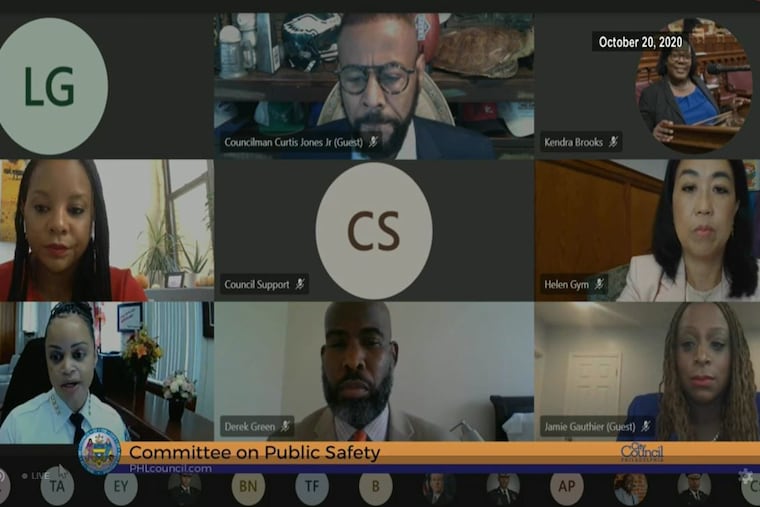Philly city councilmembers press the Police Department on the tactics officers used during the spring’s unrest
The hearing represented the latest effort by Council to probe the Police Department’s tactics during the protests that began on May 30.

Philadelphia city councilmembers on Tuesday pressed Police Commissioner Danielle Outlaw on the disparity in tactics her department used during widespread demonstrations against police brutality this spring, questioning why officers responding to unrest in West Philadelphia — a predominantly Black neighborhood — fired tear gas out of armored vehicles, while white men carrying bats in Fishtown were allowed to walk the streets without being stopped.
Though the session was nominally dedicated to exploring the possibility of permanently banning the use of tear gas, rubber bullets, or other “less lethal munitions” against protesters in the city, several councilmembers used the committee hearing to probe the differing ways the Police Department handled days of protests after George Floyd was killed by police in Minneapolis.
Helen Gym, who has sponsored a bill to ban the use of such non-deadly force against protesters, said the discussion was necessary for several reasons: To have a public forum to reckon with the department’s actions during the demonstrations — which the Police Department is also examining behind closed doors — and to recognize that policies will fall short if they are applied inconsistently across different neighborhoods, or toward different people.
Jamie Gauthier said discussions about revising policies needed to be informed by the department’s history with residents in the city, especially in predominantly Black and brown neighborhoods where people have long felt the impact of heavy-handed policing and law enforcement.
“We need to have real restoration of relationships, and a real understanding of a history of these neighborhoods' relationships to the police,” Gauthier said, adding that she believed if people in West Philadelphia had been carrying bats as the men in Fishtown had been, they would have been treated differently by authorities.
To that assertion, Outlaw replied: “You’re right.” The commissioner also said the department has been reviewing and updating a variety of policies while it conducts its own “after-action reports" studying how it responded to the protests and what steps it can take to improve.
The hearing represented the latest effort by Council to probe the Police Department’s tactics during the protests that began on May 30. Earlier this month, residents testified about the impact of police using tear gas, rubber bullets, and other heavy-handed tactics on and around 52nd Street in West Philadelphia on May 31, and on I-676 on June 1.
Outlaw in June issued a moratorium on the use of tear gas on peaceful protesters, but Gym’s proposed legislation would make such a ban permanent under city law. The committee approved the bill at the end of Tuesday’s hearing, advancing it toward possible enactment.
Outlaw avoided taking a definitive stance on the bill during her testimony. Advocates say less lethal munitions can be dangerous and traumatic for residents — and point out that tear gas is banned in warfare by the Geneva Convention — but some experts say taking away such tactics could leave police with only physical force.
Separate from that issue, Outlaw told councilmembers the Police Department had revised, or continues to evaluate, a host of other policies, including use-of-force policies to ban officers from sitting on a person’s neck, face, or head, and requiring officers to report instances of pointing their weapons at someone, even if they don’t fire any shots.
As for questions over why police had seemed to treat the men in Fishtown differently from West Philadelphia residents, Outlaw and Deputy Commissioner Ben Naish said that carrying a bat is not a crime and that officers in Fishtown were trying to avoid escalating a potentially volatile situation. In West Philadelphia, police were responding to reports that included ongoing property destruction.
Naish added that police did later arrest and charge someone with assaulting a WHYY producer and his girlfriend in Fishtown. The case is awaiting a preliminary hearing.
Outlaw also again acknowledged that police were not sufficiently prepared for extended demonstrations, which spread to areas she said authorities did not expect, and included what she called an unexpected level of property destruction, theft, and injuries to more than 100 police officers and an unknown number of residents.
“The level of planning we know now should have taken place prior to this did not happen,” Outlaw said.